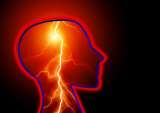Dementia accounts for higher death rate among people with epilepsy
Fewer people are dying of epilepsy itself, but deaths are on the rise from other causes
8/24/2020

Mortality rates are increasing among people with epilepsy in the United States, even as death rates among the general population are declining. Neurology researchers at UCLA dug into the data to find out what’s causing the increase.
“Even though mortality in people with epilepsy is increasing, epilepsy as the underlying cause of death is decreasing,” said neurologist Christopher DeGiorgio, MD, of the David Geffen School of Medicine at UCLA. “It does not look like the increase in mortality is due to failure in epilepsy treatment.” Instead, much of the increased mortality comes from an increase in the numbers of persons with epilepsy, dementia, and cancer.
Over the last 20 years, the annual mortality rate among people with epilepsy has increased from 5.8 deaths per million patients in 1999 to 11.6 per million in the year 2017. This statistic has raised concerns that people with epilepsy aren’t getting adequate medical treatment. However, that doesn’t seem to be the case.
In a study published this week in BMJopen, Dr. DeGiorgio and his colleagues sifted through death data for people with epilepsy from the CDC online database to find the causes of death. The researchers looked at data from the years 1999-2017 and included the “multiple cause of death” database.
They found that in 1999, 52% of deaths among people with epilepsy were caused by epilepsy itself, but by 2017, that proportion had dropped to 38%.
Epilepsy causes death in several ways. Falls, drowning, burns, and other trauma can occur when a person is incapacitated by a seizure, and epilepsy would be considered the cause of death in these cases.
Sudden unexpected death from epilepsy, or SUDEP, is a rare but frightening occurrence in which a person with epilepsy dies suddenly without any obvious cause. Disney Channel star Cameron Boyce died of SUDEP last year at age 20, bringing national attention to this tragic condition. Exactly how SUDEP causes death remains poorly understood, but it may involve damage to the brain’s ability to regulate breathing.

The researchers also found that deaths from heart disease decreased among people with epilepsy at a similar rate that they have decreased among the general population. However, deaths from Alzheimer’s disease and other dementia increased by more than 200% between 1999 and 2017. Cancer deaths, meanwhile, went up 50%.
“Because Alzheimer’s disease is increasing dramatically in the population, that is partly driving the increase in the mortality rate of epilepsy,” said Dr. DeGiorgio.
In recent years, researchers have uncovered a link between Alzheimer’s disease and epilepsy. People with epilepsy develop Alzheimer’s disease at a rate 6 times higher than the non-epileptic population, and seizures can damage the memory centers of the brain and contribute to dementia. The number of people with Alzheimer’s disease has increased dramatically over the last 20 years, and that increase is partially responsible for the increase in epilepsy deaths.
One way to understand these statistics is that as epilepsy care improves, people with epilepsy are living longer, and an increase in longevity contributes to a higher rate of diseases like dementia and cancer.
The increase in cancers should prompt a careful investigation of epilepsy medications, to determine whether they are contributing to an increased risk of tumors. Overall, though, the findings can be cause for optimism when it comes to epilepsy treatment.
“There’s good news here, that people with epilepsy are benefiting from reductions in heart disease, which is contrary to what a lot of people were thinking,” said Dr. DeGiorgio. “It’s not due to a failure in treatment and not due to an increase in lethality of epilepsy.”
Media Contact
Marrecca Fiore
310-562-4161
[email protected]
Receive timely news releases from the Department of Neurology!